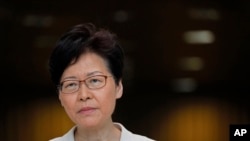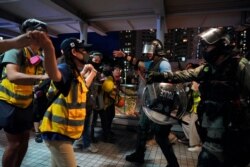Embattled Hong Kong chief executive Carrie Lam said Tuesday she has no intention of stepping down in order to end the heated anti-government demonstrations that have shaken the city for three months, and rejected reports that China’s leaders had stopped her from quitting, saying she wanted to solve the city’s political quagmire herself.
Lam was responding to a Reuters news agency report about a voice recording in which she told a group of business leaders last week that she had caused "havoc" for introducing a controversial extradition bill that sparked the protests. She told the group that she would apologize for actions and resign "if I have a choice."
But Lam told reporters Tuesday she "had not even contemplated" discussing her resignation with Chinese leaders. When asked if Beijing was stopping her from resigning, Lam said she has "never tendered a resignation to the central people’s government."
She said the release of the recording was "unacceptable."
Hong Kong residents said the recording only confirmed what political scientists and protesters have said: that despite Hong Kong’s separate constitution, Beijing runs the city. Any end to the political crisis would come at Beijing’s behest.
Protesters fear Tiananmen-style crackdown
Some have expressed concerns about a possible Chinese military intervention similar to its crackdown on the Tiananmen Square protests in 1989.
In the recording, Lam sought to assure business leaders that the Beijing government “has absolutely no plan to send in the PLA” or People’s Liberation Army."
Lam said she doesn't know how long it will take to end the civil disobedience but that she remains confident of restoring law and order, adding that Beijing has no plans to resolve the crisis by Oct. 1, the 70th anniversary of the People’s Republic of China.
“It would be naive of me to paint you a rosy picture that things will be fine or I have a deadline,” Lam says in the recording. “But I can assure you that Beijing does not have a deadline. The know this will ripple on. They and ourselves have no expectation that we could clear out this thing before the first of October.”
Lam was elected as Hong Kong's chief executive by a pro-Beijing committee of Hong Kong business and civic leaders.
The protests over the now-suspended extradition bill, which would have sent criminal suspects to mainland China to face trial, have since evolved into calls for greater democracy and an independent probe into allegations of police brutality.
Violent clashes, arrests
The demonstrations have nearly ground everyday life in the Asian financial hub to a halt, with protesters disrupting activities at the city's subway system and airport. Hundreds of protesters have been arrested amid violent clashes with police, who have wielded batons and fired tear gas and water cannons to disperse the crowds.
China’s foreign ministry spokesman, Geng Shuang, said in a regular news briefing on Monday that the demonstrations in Hong Kong had “completely exceeded the scope of freedom of assembly.”
“They have evolved into extreme and violent actions,” he said, reiterating Beijing’s support for the Hong Kong government and police.






